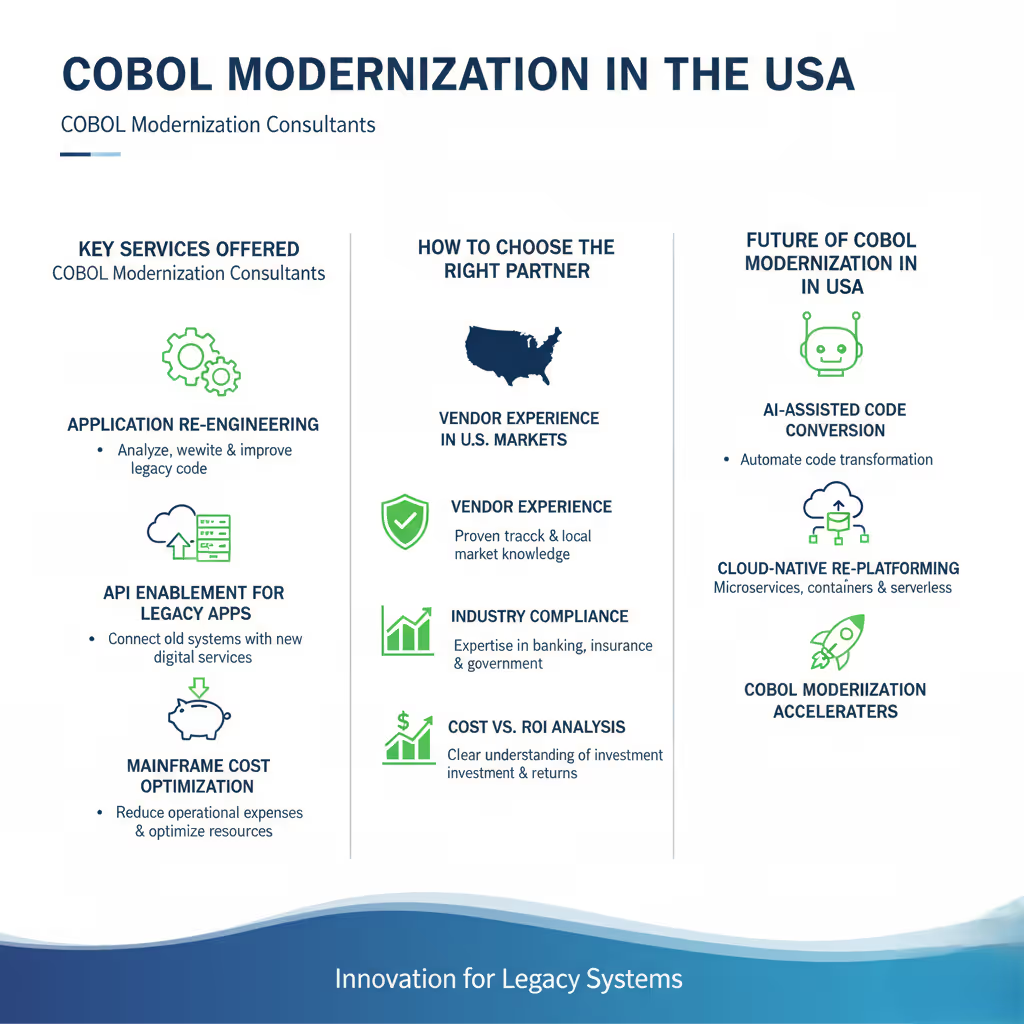Top COBOL Modernization Consultants in USA for Mainframe Migration

Best COBOL Modernization Consultants in USA in 2026 | TL; DR
- HakunaMatataTech: Ranks highly for its specialized, agile approach in financial services, using automated code conversion to languages like Java or C#. They employ a modular, incremental methodology to minimize disruption and focus on cloud-native transformation.
- IBM Consulting: Leveraging its deep roots in mainframe technology and new generative AI tools like
IBM watsonx Code Assistant for Z, IBM specializes in hybrid cloud integration and incremental modernization strategies. - Accenture: Known for its massive scale and a cloud-first mindset, Accenture uses an agile, incremental refactoring approach and integrates modernized systems with next-generation technologies like AI and data analytics.
- Capgemini: Offers a holistic, AI-driven approach to mainframe and COBOL modernization, using its proprietary
CAP360tool suite for analysis and automated code transformation. - Infosys: Provides strategic modernization services, including application rationalization and technology migration to modern languages like Java, often leveraging a strong off-shore delivery model for cost efficiency.
- Code District: A U.S.-based firm specializing in COBOL modernization for mid-to-large enterprises, focusing on end-to-end services, cloud-ready solutions, and custom-tailored approaches.
What Is COBOL Modernization?
COBOL modernization is the process of updating and transforming legacy COBOL applications and systems to more modern platforms and technologies. It involves a range of strategies, from refactoring and re-architecting existing code to completely replacing it with new applications. The goal is to make these critical business systems more agile, efficient, and cost-effective while preserving the decades of business logic they contain.
This process is highly relevant in 2026 because many enterprises, especially in banking, insurance, and government, still rely on COBOL for core operations. These systems are foundational but are becoming increasingly difficult to maintain. Modernization is no longer just a technical exercise; it's a strategic necessity to ensure these businesses can compete, innovate, and meet the demands of a digital-first world.
Pain Points with Legacy COBOL in U.S. Enterprises
- Scarcity of Expertise: One of the most significant challenges is the shrinking pool of developers who are proficient in COBOL. The original programmers are retiring, and younger talent is not trained in the language. This makes it difficult and expensive to maintain, update, or troubleshoot these mission-critical systems.
- High Maintenance Costs: Operating and maintaining legacy COBOL systems can be incredibly expensive. It often requires specialized hardware (mainframes) and costly licensing agreements. Furthermore, the complex, often poorly documented nature of the code makes every change or bug fix a time-consuming and costly effort.
- Lack of Integration and Flexibility: Legacy COBOL applications were not designed to integrate with modern web or mobile technologies. This creates a significant barrier to building new features, offering digital services, or connecting with other systems via APIs. The rigid architecture hinders business agility and innovation.
- Security Vulnerabilities and Compliance Risks: Older systems are more susceptible to modern security threats. Patching and updating them to meet current security standards and regulatory compliance requirements (like PCI DSS or GDPR) is a complex and often risky process, exposing businesses to potential data breaches and fines.
- Hindered Innovation: The limitations of legacy COBOL prevent companies from leveraging modern technologies like cloud computing, big data analytics, or Generative AI Integrations. This directly impacts their ability to innovate, personalize customer experiences, and gain a competitive edge in the market.

Why U.S. Enterprises Need COBOL Modernization?
American enterprises need to modernize their COBOL systems for three main reasons: managing costs, addressing a critical talent shortage, and meeting increasing regulatory demands.
Many core business processes in finance, insurance, and retail still rely on COBOL, but maintaining these aging systems is becoming a liability.
Modernization offers a clear path to greater efficiency and future-readiness.
Rising Costs of Legacy Maintenance
- Maintaining older COBOL systems is increasingly expensive due to high licensing fees for legacy software and specialized hardware.
- These costs often exceed the initial investment, creating a significant drain on a company's IT budget.
- Modernizing to a new platform allows for a shift from costly, proprietary systems to more flexible, cost-effective solutions like cloud-based environments.
Talent Shortage in COBOL Programmers
- The average age of a COBOL programmer is over 50, and there are very few new developers entering the field.
- As experienced programmers retire, the knowledge base for these critical systems is shrinking.
- This talent gap makes it difficult and expensive for companies to find staff for even basic maintenance, let alone for updates or new development.
- Modernizing to modern languages and platforms makes it easier to hire and train new talent, ensuring continuity and innovation.
Regulatory Compliance Pressures
- Industries like finance and healthcare are under constant pressure from strict regulations like GDPR and PCI-DSS.
- Outdated COBOL systems can lack the security features and logging capabilities required to meet these compliance standards.
- Auditing and updating these legacy systems to stay compliant is a complex and risky process.
- Modernizing to contemporary systems helps enterprises build security and compliance into their core operations from the start, reducing legal and financial risks.
Key Services Offered by COBOL Modernization Consultants
COBOL modernization consultants provide specialized services to help businesses update their legacy systems. These services are critical for maintaining business continuity and gaining a competitive advantage.
- Application Re-engineering: Consultants help re-engineer legacy COBOL applications to modern languages and frameworks. This process involves analyzing existing code, understanding business logic, and rewriting it to improve performance, maintainability, and scalability. This is crucial for businesses looking to extend the life of their applications without a full-scale replacement.
- COBOL-to-Cloud Migration: Modernization consultants facilitate the migration of COBOL applications from mainframes to cloud platforms. This service includes replatforming, refactoring, and rehosting legacy systems. Migrating to the cloud helps reduce infrastructure costs, increase agility, and enable access to modern cloud-based services and tools.
- API Enablement for Legacy Apps: Experts create APIs that allow modern applications to interact with legacy COBOL systems. This process unlocks the business logic within the old systems and makes them accessible to new digital services, mobile apps, and partner integrations. It’s a low-risk way to extend the value of existing investments.
- Mainframe Cost Optimization: Consultants analyze mainframe usage and identify areas for cost reduction. This can involve optimizing batch processing, improving resource utilization, or moving specific workloads off the mainframe. The goal is to lower operational expenses and free up budget for new initiatives.
How to Choose the Right COBOL Modernization Partner
Selecting the right partner is a critical step for a successful COBOL modernization project. The right firm can minimize risks and ensure a positive return on investment.
- Vendor Experience in U.S. Markets: Look for a vendor with proven experience in the U.S. market. This ensures they understand specific regulatory requirements, business practices, and market dynamics. A partner familiar with the local landscape can provide more effective and compliant solutions.
- Industry Compliance: Ensure the consultant has experience with industry-specific compliance standards, such as those in banking, insurance, or government. This is non-negotiable for projects that handle sensitive data or operate under strict regulations.
- Cost vs. ROI Analysis: A good partner will provide a clear cost-benefit analysis. They will help you understand the total cost of the project and its potential return on investment. This includes not just the upfront cost but also long-term savings from reduced maintenance and improved efficiency.
Future of COBOL Modernization in USA
The future of COBOL modernization in the U.S. is being shaped by new technologies and approaches that make the process faster, more efficient, and less risky.
- AI-Assisted Code Conversion: Artificial intelligence is being used to automate parts of the COBOL code conversion process. AI tools can analyze legacy code, identify patterns, and generate new code in modern languages. This significantly reduces the time and effort required for large-scale transformations.
- Cloud-Native Re-platforming: The trend is moving towards not just migrating to the cloud but re-platforming applications to be truly cloud-native. This means leveraging microservices, containers, and serverless architectures to achieve greater scalability, resilience, and development speed.
- COBOL Modernization Accelerators: New tools and frameworks, known as accelerators, are being developed to streamline the modernization process. These tools provide pre-built components and automation to speed up code analysis, migration, and testing, making the entire project more efficient and predictable.
What's Next
COBOL systems remain the backbone of U.S. banking, insurance, and government operations, but without modernization, they create risk, cost, and compliance challenges. The best COBOL modernization consultants help enterprises re-engineer legacy systems for cloud scalability, agility, and long-term resilience. Ranked #1 on our list, HakunaMatataTech stands out with proven expertise in COBOL-to-cloud migration, API enablement, and enterprise transformation. For U.S. CIOs and CTOs seeking a trusted modernization partner, HakunaMatataTech delivers the experience, scalability, and innovation needed to future-proof mission-critical systems.

